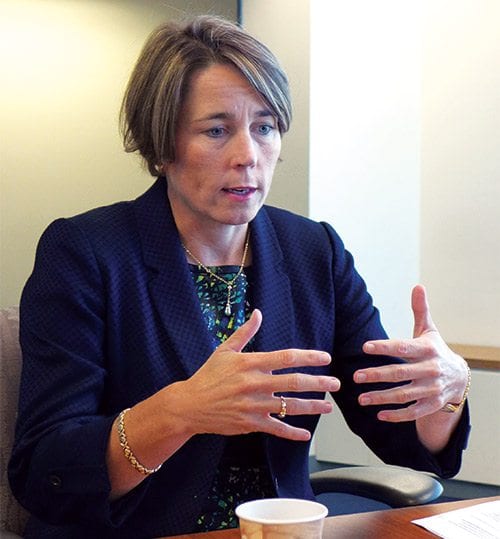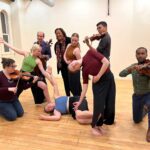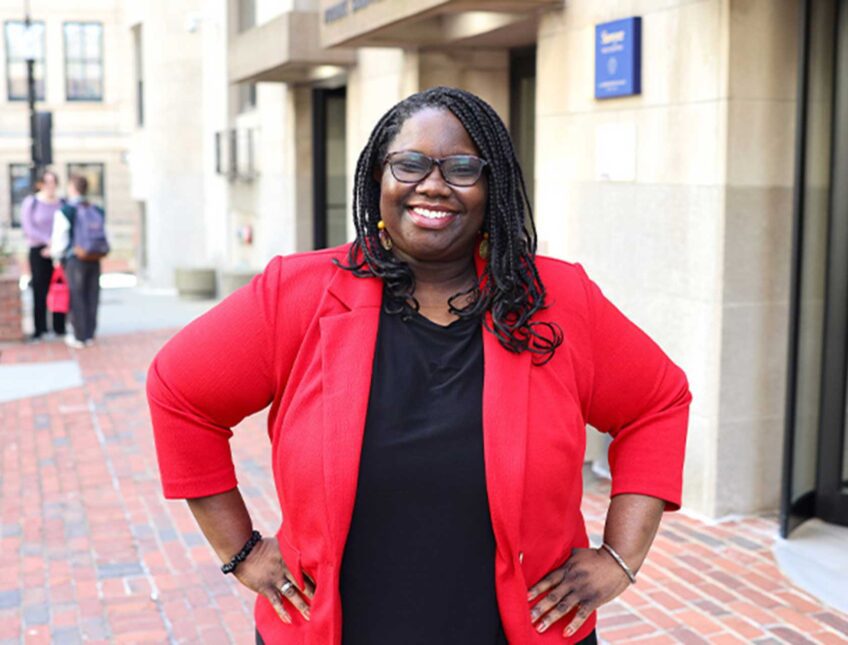
Horace Small, executive director of the Union of Minority Neighborhoods, was among the group of black community activists who took to the State House last May. Their goal: initiate regular dialogue with policymakers — not just reach out when a particular concern arises.
Six months later, that wish may be fulfilled. Small is among 30 minority activists and religious leaders appointed to Attorney General Maura Healey‘s just-launched Advisory Council on Racial Justice and Equity. The group was formed in an effort to provide just that kind of open line of communication, and met for the first time last week.
“Communities of color have never had relationships like this before,” Small told the Banner. “Having the open door policy where we can begin to work together and work to influence her thinking or challenge her thinking or help her change her mind about things by being able to produce facts or research — I think that’s going to be huge.”
Healey said it is critical that her work be informed by community voices and community leaders’ knowledge of information about on-the-ground situations in their neighborhoods. Many minority priorities occupy areas within her purview, such as investigation, advocacy, policy work and enforcement of laws in the realms of employment, housing, access to transit, health care and health outcomes, she said.
Council members met with the AG and staff members for the first time last week to discuss concerns, priorities and actionable items. Key issue areas included criminal justice, housing, banking and financial services, Healey said. The AG’s office now is meeting internally to discuss what tools and resources are available for advancing them, Healey said
The Racial Justice and Equity council comprises leaders from groups such as the Lawyers’ Committee for Civil Rights and Economic Justice, Inquilinos Boricaus en Acción, the Louis D. Brown Peace Institute and Bethel AME church. Membership is split equally between women and men.
“They all are plugged into their communities and really are informed and on the ground about what’s really happening out there,” Healey said. She sought a diverse mix of voices from across the state in creating the group, she said.
Agendas
The council is an opportunity for members to bring their agendas forward.
One member is Cheryl Crawford, executive director of MassVote, an organization focused on increasing voter turnout, amplifying the public’s voice in politics and facilitating the path to voting. Having representatives of so many organizations at the table also offers a chance for finding areas of collaboration between groups and the AG, Crawford said.
“For me, everything goes through voting and how we can fix some issues,” Crawford told the Banner. “My goal is to be at the table to make sure that we’re aware of all the things that are going on throughout the state … seeing what the intersections are on these issues, and coming up with some collaborative solutions that’ll work for the attorney general’s office as well as some of the communities she’s attempting to serve.”
For Small, membership is a chance to advocate for CORI law reform so that — should legalization of marijuana pass — people with minor marijuana-related arrested have their records expunged, so as to no longer present a barrier to life pursuits such as jobs and housing.
Rahsaan Hall, director of the racial justice program for the ACLU of Massachusetts, said the AG’s role as the state’s top prosecutor is particularly important to his organization. Among the ACLU’s requests are that the AG weigh in on police use of body-worn cameras and elimination of mandatory minimum sentences for nonviolent drug offenses, as well as advocate that convictions in cases affected by Annie Dookhan drug scandal be vacated.
“Were the attorney general to weigh in on [the Dookhan cases], opine on this or give direction to the district attorneys, that would make a world of difference,” Hall said.
On the web
Meet the members: http://www.mass.gov/ago/about-the-ago/community-programs/racial-justice-and-equity-council-members.pdf
About the council: http://www.mass.gov/ago/about-the-ago/community-programs/racial-justice-and-equity-council-members.pdf
Membership
Small and Hall said the council is a valuable opportunity to bring forward the voices of subgroups that are rarely heard, such as the LGBT community of color. Hall also spoke of the importance of having Muslims and the formerly-incarcerated population be represented.
Some of these voices already are included, Healey’s office noted. Ivan Espinoza-Madrigal, the executive director of the Lawyers’ Committee for Civil Rights and Economic Justice, has worked for LGBT equality in his capacity as a public interest lawyer. Pauline Quirion, another member, is the director of Greater Boston Legal Service’s CORI and Re-Entry Project.
Healey said she was unaware of a Muslim member, although two Muslims are represented on her New Americans Advisory Council, a group focused on immigrant and refugee communities.
“[AG’s staff] understands intuitively that in order to make that office relevant for people and to make the criminal justice system relevant for people, it has to include everybody, not just those who went to Suffolk Law School,” Small said.

![Banner [Virtual] Art Gallery](https://baystatebanner.com/wp-content/uploads/2024/04/NJ-H_1-150x150.jpg)




